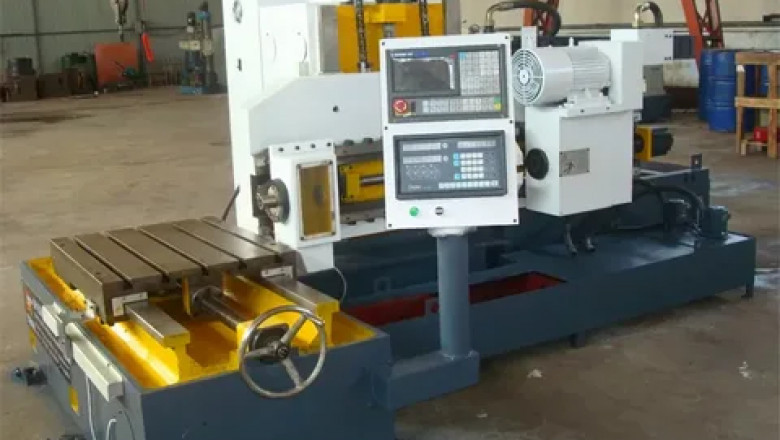views
An Industrial Deep Hole Drilling Machine is a highly specialized tool engineered for creating precise and deep holes in various materials such as metals, plastics, and composites. These machines are used in industries like aerospace, oil and gas, automotive, medical, and heavy equipment manufacturing. Unlike conventional drilling machines, deep hole drilling machines are designed to handle extreme depth-to-diameter ratios—often greater than 10:1—ensuring hole straightness, diameter accuracy, and surface finish quality.
There are several techniques involved in deep hole drilling, including BTA (Boring and Trepanning Association), gun drilling, and ejector drilling. Each method requires specific machine configurations depending on the application’s complexity and precision requirements. A well-designed Industrial Deep Hole Drilling Machine ensures optimal performance with integrated features like high-pressure coolant systems, vibration dampening, and advanced control panels. Understanding these fundamentals is critical before selecting a machine for your specific application.
Evaluating Your Application Requirements
Choosing the right Industrial Deep Hole Drilling Machine begins with a clear understanding of your specific application needs. Factors such as hole diameter, hole depth, material hardness, and production volume directly influence the machine’s specifications. For example, gun drilling is ideal for smaller diameters and high precision, while BTA drilling is better suited for larger holes with high material removal rates. The choice of machine also depends on whether you require straight holes, angled bores, or complex geometries.
Another important consideration is the level of automation needed. Some applications benefit from CNC-controlled machines for higher accuracy and repeatability, especially when producing parts in large quantities. Additionally, factors like required tolerances, surface finish, and production speed should be aligned with the machine’s capabilities. Customizations may also be necessary for niche applications. Identifying and defining these requirements early helps narrow down the best Industrial Deep Hole Drilling Machine that aligns with your operational goals.
Comparing Machine Types and Technologies
There are three main types of Industrial Deep Hole Drilling Machines: single-spindle machines, multi-spindle machines, and special-purpose machines. Single-spindle machines are ideal for low-to-medium volume operations requiring flexibility and accuracy. Multi-spindle machines offer higher productivity and are commonly used in mass production environments. Special-purpose machines are custom-built for unique applications that involve specialized materials or configurations. Knowing the differences between these types helps determine which one is best suited for your manufacturing environment.
Technological advancements have also revolutionized deep hole drilling processes. Modern machines now come equipped with sophisticated CNC systems, real-time monitoring, automated tool changers, and high-pressure coolant delivery. These features enhance accuracy, reduce human error, and increase overall throughput. Machines that utilize vibration-dampening mechanisms and adaptive cutting technologies can significantly reduce tool wear and improve surface finish. When selecting an Industrial Deep Hole Drilling Machine, it’s important to assess both traditional features and modern innovations that contribute to long-term value and performance.
Considering Build Quality, Brand, and After-Sales Support
The build quality of an Industrial Deep Hole Drilling Machine significantly affects its durability and precision. Machines constructed with rigid and vibration-resistant materials such as cast iron and steel provide a more stable platform for deep drilling operations. High-quality linear guides, ball screws, and spindle systems also contribute to long-lasting performance and minimal maintenance. Skimping on quality to save upfront costs often results in frequent breakdowns and increased total cost of ownership.
Brand reputation and after-sales support are equally important when investing in industrial machinery. Reputable manufacturers not only offer better product warranties but also provide installation, training, and technical support. Many top-tier brands have global service networks, ensuring fast and reliable maintenance assistance. Spare parts availability, software updates, and machine retrofitting services should also be considered. A reliable partner can make a significant difference in ensuring that your Industrial Deep Hole Drilling Machine operates efficiently and remains productive for years.
Calculating Long-Term ROI and Operational Efficiency
Investing in an Industrial Deep Hole Drilling Machine involves more than just the initial purchase cost. To make a smart investment, you must consider the total cost of ownership, including energy consumption, maintenance, tooling, and downtime. Machines that offer higher drilling speeds, longer tool life, and efficient chip removal systems can drastically lower operating costs over time. Additionally, selecting a machine that minimizes waste and requires less manual intervention can boost productivity and ROI.
Operational efficiency is another key factor when choosing a deep hole drilling solution. Machines equipped with intelligent control systems, real-time performance analytics, and remote diagnostics can provide valuable data insights that help in decision-making and process optimization. The ability to integrate the machine with other systems, such as ERP or MES, further improves workflow efficiency. When these elements align, your Industrial Deep Hole Drilling Machine becomes not just a tool, but a strategic asset that drives innovation, quality, and profitability in your business.














Comments
0 comment